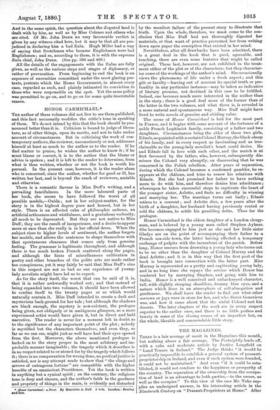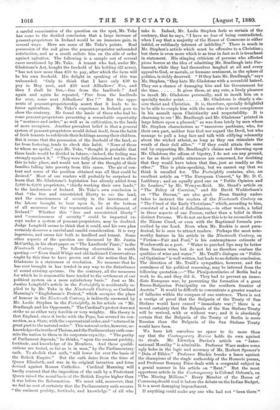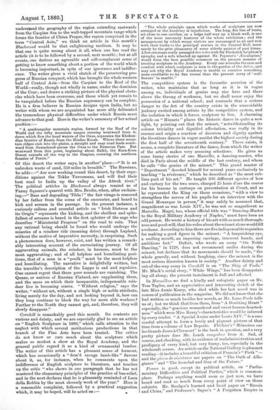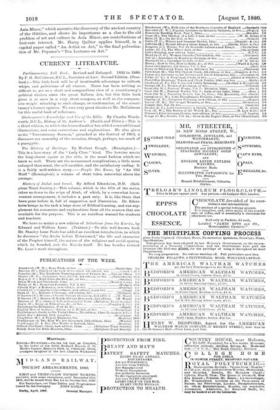THE MAGAZINES.
THERE is a fair average of merit in the Magazines this month, but nothing above a fair average. The Fortnightly leads off, with a calm and moderate article by Justice Longfield on " Land Tenure in Ireland." The Judge thinks " it would be practically impossible to establish a general system of peasant- proprietorship in Ireland, and even if such system were founded, it could not be maintained." And even " if it could be esta- blished, it would not conduce to the happiness or prosperity of the country. The separation of the ownership from the occupa- tion of land is an advantage to both parties,—to the owner, as well as the occupier." To this view of the case Mr. Tuke sup- plies an undesigned answer, in his interesting article in the Nineteenth Century on " Peasant-Proprietors at Home." After a careful examination of the question on the spot, Mr. Puke has come to the decided conclusion that a large increase of peasant-proprietors in Ireland would be an immense gain, in several ways. Here are some of Mr. Tuke's points. Real possession of the soil gives the peasant-proprietor unbounded satisfaction, and as a result enlists him on the side of order against agitation. The following is a sample out of several cases mentioned by Mr. Tuke. A tenant who had, under Mr. Gladstone's Act, bought the freehold of his holding (22 acres), "has not now more than £50 to pay, after which the farm will be his own freehold. His delight in speaking of this was unbounded. ' Only to think that I have only £30 to pay in May next, and £20 next Allhallows' Eve, and then I shall be free,—free from the landlords !' And again and again he repeated, Free from the landlords for ever, come next Allhallows' Eve !' " But the oppo- nents of peasant-proprietorship assert that it leads to in- ferior agriculture. Mr. Tuke's experience in Ireland goes to show the contrary. He found the lands of those who had be- come peasant-proprietors presenting a remarkable superiority in "neatness and order," as well as in cultivation, to the lands of mere occupiers. Another prevalent belief is that a general system of peasant-proprietors would defeat itself, from the habit of Irish tenants to subdivide their holdings among their children. But it seems that the possession of the freehold of the land, so far from fostering, tends to check this habit. "None of those to whom we spoke," says Mr. Tuke, "thought it probable that these lands would be divided in future,—indeed, the feeling was strongly against it." " They were fully determined not to allow this to take place, and would not hear of the thought of their families falling into poverty from this cause. The air of con- tent and sense of the position obtained was all that could be desired." Most of our readers will probably be surprised to learn that Mr. Gladstone's legislation has already added from 5,000 to 6,000 proprietors, " chiefly working their own lands," to the landowners of Ireland. Mr. Tuke's own conclusion is that " the free and unrestricted liberty to use the land, and the consciousness of security in the investment of the labour brought to bear upon it, lie at the bottom of all measures for the regeneration and development of Ireland." Whether this " free and unrestricted liberty " and "consciousness of security" could be imparted ex- cept under a system of peasant-proprietors, may be doubted. Judge Longfield seems to think that it could, and his own plan certainly deserves a careful and candid consideration. It is very ingenious, and seems fair both to landlord and tenant. Some other aspects of the question are discussed by Mr. Justin McCarthy, in his short paper on " The Landlords' Panic," in the Nineteenth Century. The following observation is worth quoting :—" Even timid Whigs and old-fashioned Conservatives ought by this time to have grown out of the notion that Mr. Gladstone is a statesman of revolution. No measure that he has ever brought in has tended in any way to the disturbance of sound existing systems. On the contrary, all the measures for which he is responsible have tended to the settlement of our political system on a more satisfactory basis." Just as Mr. Justice Longfield's article in the. Fortnightly is accidentally re- plied to by Mr. Take in the Nineteenth Century, so Cardinal Manning's "Englishman's Protest," which occupies the place of honour in the Nineteenth Century, is indirectly answered by Mr. Leslie Stephen in the Fortnightly, in his article on "Mr. Bradlaugh and his Opponents." The Cardinal's protest does not strike us as either very forcible or very weighty. His theory is that England, since it broke with the Pope, has severed its con- nection, as a State, with the supernatural order, and " returned in great part to the natural order." This natural order, however, ac- knowledges the truths of Theism, and the Parliamentary oath com- mits the nation to them in its corporate capacity. " The purity of Parliament depends," he thinks, " upon the eminent probity, fortitude, and knowledge of its Members. And these qualifi- cations are tested, so far as is in man," by the Parliamentary oath. To abolish that oath, " will lower for ever the basis of the British Empire." But the oath dates from the time of Queen Elizabeth, and was in its original intention and form devised against Roman Catholics. Cardinal Manning will hardly contend that the imposition of the oath by a Protestant Queen raised the moral basis of the British Empire higher than it was before the Reformation. We must add, moreover, that we feel no sort of certainty that the Parliamentary oath secures "the eminent probity, fortitude, and knowledge" of all who take it. Indeed, Mr. Leslie Stephen feels so certain of the contrary, that he says, "I have no fear of being contradicted, when I say that a majority of the House of Commons is either infidel, or sublimely tolerant of infidelity." There is much in Mr. Stephen's article which must be offensive to a Christian ; but there is even more which is as true in fact as it is trenchant in statement. His stinging criticism of persons who affected pious horror at the idea of admitting Mr. Bradlaugh into Par- liament, while they had themselves laughed at all and every appeal to God, or morals, or humane sentiment, in the sphere of politics, is richly deserved. " If they hate Mr. Bradlangh," says Mr. Stephen, "they hate Mr. Gladstone with a sevenfold hatred. They see a chance of damaging him and his Government .for
the time It gives them, at any rate, a lively pleasure to insult Mr. Gladstone personally, and to insult him on a
specially tender point Mr. Gladstone is clearly a sin- cere theist and Christian. It is, therefore, specially delightful to be able to couple him with the man who is most conspicuous in his assault upon Christianity and respectability. It is charming to see Mr. Bradlaugh and Mr. Gladstone' printed in large letters upon a placard," as was done lately by men whom Mr. Stephen characterises as " rancorous partisans, who, for their own part, neither fear God nor regard the Devil, but who manage to pull a long face and talk with edifying solemnity about the wicked atheist, as long as they can stimulate the wrath of their dull allies." " If they could attain the same end by supporting Mr. Bradlaugh's claims and throwing upon Mr. Gladstone the odium of bigotry, I do not see any ground, so far as their public utterances are concerned, for doubting that they would have taken that line, just as readily as the other." This is plain-speaking, but we cannot say that we think it uncalled for. The Fortnightly contains, also, an excellent article on " The European Concert," by Mr. D. C. Lathbury ; and an equally good one on " Public Opinion and its Leaders," by Mr. Wemyss-Reid. Mr. Stead's article on " The Policy of Coercion," and Sir David Wedderburn's on "The Deccan," are also good. Dean Stanley under- takes to instruct the readers of the Nineteenth Century on " The Creed of the Early Christians," which, according to him, consisted of a kind of Sabellianism,—in other words, a belief in three aspects of one Person, rather than a belief in three distinct Persons. We do not see how this is to be reconciled with the Nicene Creed, or even with the Baptismal formula pre- scribed by our Lord. Even when Mr. Ruskin is most para- doxical, he is sure to attract readers. Perhaps the most note- worthy feature in his article in the Nineteenth Century, on "Fiction—Fair and Foul," is his contemptuous estimate of Wordsworth as a poet. " Water to parched lips may be better than Samian wine, but do not let us therefore confuse the qualities of wine and water." Mr. Trail's dialogue on "Politi- cal Optimism " is well written, but leads to no definite conclusion. The direction of Mr. Traill's sympathies, however, and the soundness of his political reasoning, may be inferred from the following quotation :—" The Plenipotentiaries of Berlin had a work to do, and they did it. They had to prevent an imme- diate European war, by preventing the formation of a great Russo-Bulgarian Principality on the southern frontier of Austria." It would be difficult to concentrate a greater number
of fallacies within the compass of one sentence. There is not a vestige of proof that the Bulgaria of the Treaty of San Stefano would have caused " immediate war;" there is a moral certainty that the Bulgaria of the San Stefano Treaty will be revived, with or without war; and it is absolutely certain that the Bulgaria of the Treaty of Berlin is more Russian than the Bulgaria of the San Stefano Treaty would have been.
We have left ourselves no space to do more than say that the Contemporary Review holds its own against its rivals. Mr. Llewelyn Davies's article on " Inter- national Morality " is admirable. Professor Wace makes some ugly holes in the logic and accuracy of Mr. Herbert Spencer's " Data of Ethics." Professor Blackie breaks a lance against the champions of the single authorship of the Homeric poems, and Professor Bonamy Price deals with a congenial subject in a genial manner in his article on " Rent." But the most opportune article in the Contemporary is Colonel Osborn's, on "The Missing Millions." Every Member of the House of Commone should read it before the debate on the Indian Budget. It is a most damaging impeachment.
If anything could make any one who had not "been there" understand the geography of the region extending eastwards from the Caspian Sea to the wall-topped mountain range which forms the frontier of China Proper, the region comprised in the
term " Central. Asia," we think an article in this month's Blackwood would be that enlightening medium. It may be
that one is quite wrong about it all, when one has read the article (it is to be followed by a second, next month) ; but at all events, one derives an agreeable and self-complacent sense of getting to know something about a portion of the world which is becoming important, in spite of our ignorance and indiffer- ence. The writer gives a vivid sketch of the persevering pro- gress of Russian conquest, which has brought the whole western half of Central Asia—from the Caspian to the Roof of the World—really, though not wholly in name, under the dominion of the Czar; and draws a striking picture of the physical obsta- cles which have been overcome, and those which yet remain to be vanquished before the Russian supremacy can be complete. He is a firm believer in Russian designs upon India, but no writer with whom we are acquainted has more ably delineated the tremendous physical difficulties under which Russia must advance to that goal. Here is the writer's summary of her actual position :—
"A quadrangular mountain region, formed by the Roof of the World and the lofty mountain ranges running westward from it, down which flow the head waters of the Oxus, separates the Kbokan- dian frontier of Russia from the Hindoo Koosh. Where these moun- tain ridges sink into the plains, a straight and easy road leads south- ward from Samarkand across the Oxus to the Bameean Pass. Bat westward from this point, beginning about Balkh, the Kara-Kum Desert extends all the way to the Caspian, covering the northern frontier of Persia."
Of this desert the writer says, id another-place :—" It is an unbroken waste of sand, 350 miles in breadth." The Russians,
Ore adds :—" Are now working round this desert, by their expe- ditions against the Tekke Turcomans, and will find their
best road to India up the valley of the Attrek river." The political articles in Blackwood always remind us of
Fanny Squeers's quarrel with Mrs. Brodie, when, after exclaim- ing,—" Base and degrading "filda!" the fair virago is removed by her father from the scene of the encounter, and heard to kick and scream in the passage. In the present instance, a curiously callous and scornful article on " Irish Distress and its Origin" represents the kicking, and the shrillest and spite- fullest of screams is heard in the first splutter of the sage who describes " Ministerial Progress " on the road to ruin. That any rational being should be found who would undergo the miseries of a reindeer ride (meaning drive) through Lapland, without the motive of imperative necessity, is surprising. Such a phenomenon does, however, exist, and has written a remark- ably interesting account of the excruciating journey. Of all aggravating animals, the reindeer, in harness, must be the most aggravating ; and of all helpless and humiliating posi- tions, that of a man in a " poolk " must be the most helpless and, humiliating. The narrative is delightfully written, but the traveller's description of the Lapps is sad and repulsive.
One cannot regret that these poor nomads are vanishing. The Quans, or natives of Russian Finland, are supplanting them, and the moss on which their inseparable, indispensable rein- deer live is becoming scarce. " Without religion," says the writer, " without art, without a single high or noble attribute, living merely .for the day, and not looking beyond it, how can they long continue to block the way for more able workers ?
Farther to the North they cannot get, and, therefore, they will slowly disappear."
Cornhill is remarkably good this month. Its contents are
various and dainty, and we are especially glad to see an article on " English Sculpture in 1880," which calls attention to the neglect with which several meritorious productions in that branch of the Fine Arts have been treated. The critics do not know or care much about the sculpture which makes so modest a show at the Royal Academy, and the general public regard it as a kind of ornamental lumber.
The writer of this article has a pleasant sense of humour, which has occasionally a " dem'd savage lamb-like" flavour about it, as, for instance, when he comments upon the indifference of English sculptors to literature, and touches up the critic " who shows in one paragraph that he has not mastered the elementary principles of the practice of bas-relief, and in the next declares that he is pleasantly reminded of Luca della Robbie by the most slovenly work of the year." Here is a reasonable complaint, followed by a practical suggestion which, it may be hoped, will be acted on :—
"The whole principle upon which works of sculpture are now arranged at the Academy is injudicious. The long, flat line of busts, set close to one another, on a ledge half-way up a blank wall, is one of the most uncomely features of the whole exhibition ; and the arrangement by which weary visitors are encouraged to sit and rest with their backs to the principal statues in the Central Hall, must surely be the grim pleasantry of some elderly painter of past times. A few ottomans cosily arranged dos-a-dos with Sir Frederick Leighton's nymphs, and a sofa wheeled up against Mr. Poynter's ' tEsculapius,' would form the best possible comment on the present manner of treating sculpture in the Academy. Every one remarks the ease and comfort with which sculpture is seen in the garden of the Salon, and may ask why the Royal Academy is unable to contrive something more creditable to its fine rooms than the present array of ' wall- flowers' in marble."
The competitive system is the favourite aversion of the writer, who maintains that as long as it is in vogue among us, individuals of genius may rise hero and there above the throng of workmen, but we shall never enjoy the possession of a national school; and contends that a serious danger to the Art of the country exists in the unavoidable jealousy excited among artists by the competitive system, and the isolation in which it forces sculptors to live. A charming article on " Minuets " places the historic dance in quite a new light, by pointing out that the minuet, "notwithstanding its solemn triviality and dignified affectation, was really in its essence and origin a reaction of decorum and dignity against the licentious dances in vogue amidst the highest society during the first half of the seventeenth century." There exists, it seems, a complete literature of the dance, from which the writer of the article makes very amusing selections. He gives us some funny stories of one Marcello, a dancing-master, who died in Paris about the middle of the last century, and whom he calls "the genius of the minuet." This grand master of " Deportment " devoted himself for several years exclusively to teaching " la r4verence," which ho described as " the most sub- lime part of his art." He taught 236 different species of bow and curtsey for the two sexes, charged 25 louis d'ors the course for his lessons in curtseys on presentation at Court, and as he represented the King on those occasions, " with a view to strengthen the nerves of his pupils for an interview with the Grand Monarque in person," it may safely be assumed that, magnificent as was Louis XIV., he was not so magnificent as Marcello. Magri, too, whose official title was " Dancing-Master to the Royal Military Academy of Naples," must have been an odd person. He wrote a history of his art with so much thorough- ness and good-will, that his rules about the minuet alone would fill a volume. According to him there are five indispensable requisites for making a good figure in the minuet : "A languishing eye, a smiling mouth, an imposing carriage, innocent hands, and ambitious feet." Dufort, who wrote an essay " On Noble Dancing," in 1728, does not recommend smiles during the
minuet, but declares that its movements should be made, " the whole gravely, and without laughing, since the minuet is the most serious diversion known in society." Another dainty and out-of-the-way essay in Corithill is on "The Ship of Fools."
Mr. Black's serial story, " White Wings," has been disappoint- ing all along; the present instalment is dull and affected.
In Macmillan we find a kindly and eulogistic paper on Mr.
Tom Taylor, and an appreciative and interesting sketch of the late Miss Annie Keary, who died while her last novel was in course of publication iu the magazine. We did not know that she- had written so much besides her novels, as Mr. Lane-Poole tells us of ; but we think that from them, from " A Doubting Heart " especially, the " gracious womanhood and sweet human-hearted- ness " which were Miss Keary's characteristics would be inferred by every reader. " A Special Assize under Louis XIV. " is a suc- cessful attempt to form a lovely and piquant picture of that time from a volume of Law Reports. Flechier's " Memoires stir lea Grands Jours it Clermont" is the book in question, and a very
pretty picture does Mr. Leach compulser from it. Sad, of course, and shocking, with its evidence of maladministration and
profligacy of every kind, but very funny, too, especially in the witchcraft scenes. An article on the National Gallery is pleasant reading—it includes a beautiful criticism of Francia's " Plea "-
and the pieces de resistance are papers on " The Oath of Alle- giance " and " The Ironclad and Gun of the Future."
Fraser is good, except its political article, on "Parlia- mentary Difficulties and Political Parties," which is common-
place. Perhaps anything would seem so just now, we have heard and read so much from every point of view on those subjects. Mr. Boulger's learned and lucid paper on " Russia and China," and Professor's Sayce's " A Forgotten Empire in
Asia Minor," which narrates the discovery of the ancient country of the Hittites, and shows its importance as a clue to the old problem of art and culture in Asia Minor, are contributions of first-rate interest. Mr. Harry Qailter applies himself, in a capital paper called "An Artist on Art," to the final pulverisa- tion of Mr. Poynter's "Ten Lectures on Art."





































 Previous page
Previous page